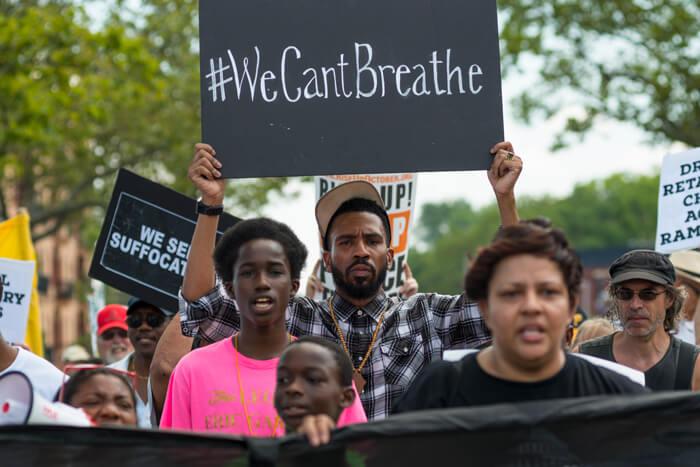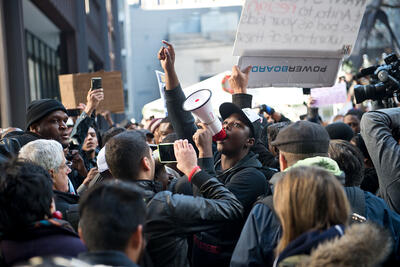Our country’s system of policing has a history of violence that disproportionately steals the lives of Black, Indigenous and other people of color along with individuals with disabilities. And despite years of protests, the Black Lives Matter movement, efforts for police reforms, and ongoing cries for justice, we continue to witness and mourn people killed and brutalized by police.
These acts of violence—along with the often lack of accountability—damages trust and affects young people across the United States, prompting parents, caregivers, educators and communities to seek resources on how to address these subjects at home or in the classroom.
The resources below can help spur much-needed discussion around implicit bias and systemic racism, but they can also help inspire us all to enact the changes that will create a more just society.
Editor's note: This web package, originally published in 2014, will be updated to reflect current events. For the latest statistics on police-related civilian deaths, see the Washington Post resource "Fatal Force."

Learning for Justice Resources and Articles:
Let’s Talk! Facilitating Critical Conversations With Students
Learning how to communicate about such topics as white privilege, police violence, economic inequality and mass incarceration requires practice, and facilitating critical conversations with students demands courage and skill. This guide offers classroom-ready strategies educators can use to plan discussions and to facilitate these conversations with students.
"Safe Saturday" Conversations About Race
An educator’s message motivated by personal unresolved grief leads to the creation of a safe space for intensive, interactive learning about racism and honest U.S. history.
Black Minds Matter
Communities have a responsibility to engage with young people about violence against Black people—and the white supremacist systems that allow it to continue. But they must do so without re-traumatizing Black students and with extra care for their mental health. This resource can help.
Solidarity as Social and Emotional Safety
Promoting mutual aid to foster solidarity and advancing restorative justice are strategies educators and other adults can employ to increase children’s feelings of safety and well-being.
“No, I Am Not OK.” Thanks for Asking.
As protesters across the nation rise up against police violence and systemic racism in support of Black lives, there’s something white allies need to recognize. Dr. Neal A. Lester explains.
Living With the Bear
Constant exposure to violence via social media is harming our students. Learn to recognize the signs to give them the support they need.
Chauvin Was Found Guilty. Now What?
This open letter reminds educators that accountability isn’t justice—and that justice requires an ongoing commitment to anti-racism from all of us.
The Black Lives Matter Movement Goes Beyond Black and White
Non-Black students of color may be learning anti-Black racism in the wake of protests following police violence. Here’s how you can counter those attitudes.
Why the Texas Police-Stop Video Is a Problem
A Texas law requires that students learn how to act appropriately when interacting with police officers, but it misses the mark by ignoring a history of policing that has not reserved the same respect for its citizens. This article illustrates how such initiatives ignore racism’s influence in police interactions.
Teaching in Solidarity
The guiding principles behind the Black Lives Matter At School Week of Action can be an important frame through which to reimagine more liberatory educational spaces for Black children.
Bringing Black Lives Matter Into the Classroom | Part II
An educator introduces ways to discuss Black Lives Matter across all grade levels.
Don’t Say Nothing
Educators’ silence speaks volumes during moments of racial tension or violence. Our students are listening.
Podcast: Criminalizing Blackness: Prisons, Police and Jim Crow
After emancipation, aspects of the legal system were reshaped to maintain control of Black lives and labor. Historian Robert T. Chase outlines the evolution of convict leasing in the prison system. And Historian Brandon T. Jett explores the commercial factors behind the transition from extra-legal lynchings to police enforcement of the color line. We examine the connections between these early practices and the more familiar apparatuses of today’s justice system—from policing to penitentiaries.
Ending systems of punitive and exclusionary discipline in schools can decrease law enforcement encounters and disrupt the school-to-prison pipeline.
Parents Push for Student Safety
A parent-led grassroots organization in Georgia chips away at punitive school discipline policies and works to remove police from their schools.
Decarceration Begins With School Discipline Reform
Educators have a role in ending discipline that criminalizes youth. Reforms, including trauma-informed and restorative practices, can disrupt the school-to-prison pipeline.
Envisioning School Safety Without Police
Communities across the country are mobilizing to improve school safety without police presence while advocating for students’ dignity
Professional Development:
Let’s Talk! Discussing Race, Racism and Other Difficult Topics With Students
Talking with students about race and privilege is hard but necessary. This webinar can help you find the words. (Be sure to read the related publication, Let's Talk! Facilitating Critical Conversations With Students.)
Let’s Talk! Discussing Black Lives Matter With Students
This webinar addresses the roots of Black Lives Matter, its platform and its connections to past social justice movements. It also offers tools for teaching about the Black Lives Matter movement.
Let’s Talk! Teaching Black Lives Matter
This sequel to Let's Talk! Discussing Black Lives Matter in the Classroom reviews the education-related policy demands within the Movement for Black Lives’ platform: Invest-Divest and Community Control.
Equity Matters: Confronting Implicit Bias
To create equitable classrooms, educators must acknowledge their own biases and take steps to confront them. This webinar can help.

Getty Images
Related External Resources
Q&A: How to Talk to Kids About Black Lives and Police Violence
Jessie Hagopian, co-editor of Teaching for Black Lives sat down with NPR to offer advice for caretakers and educators about how to begin conversations with children about police violence and the protests of 2020.
